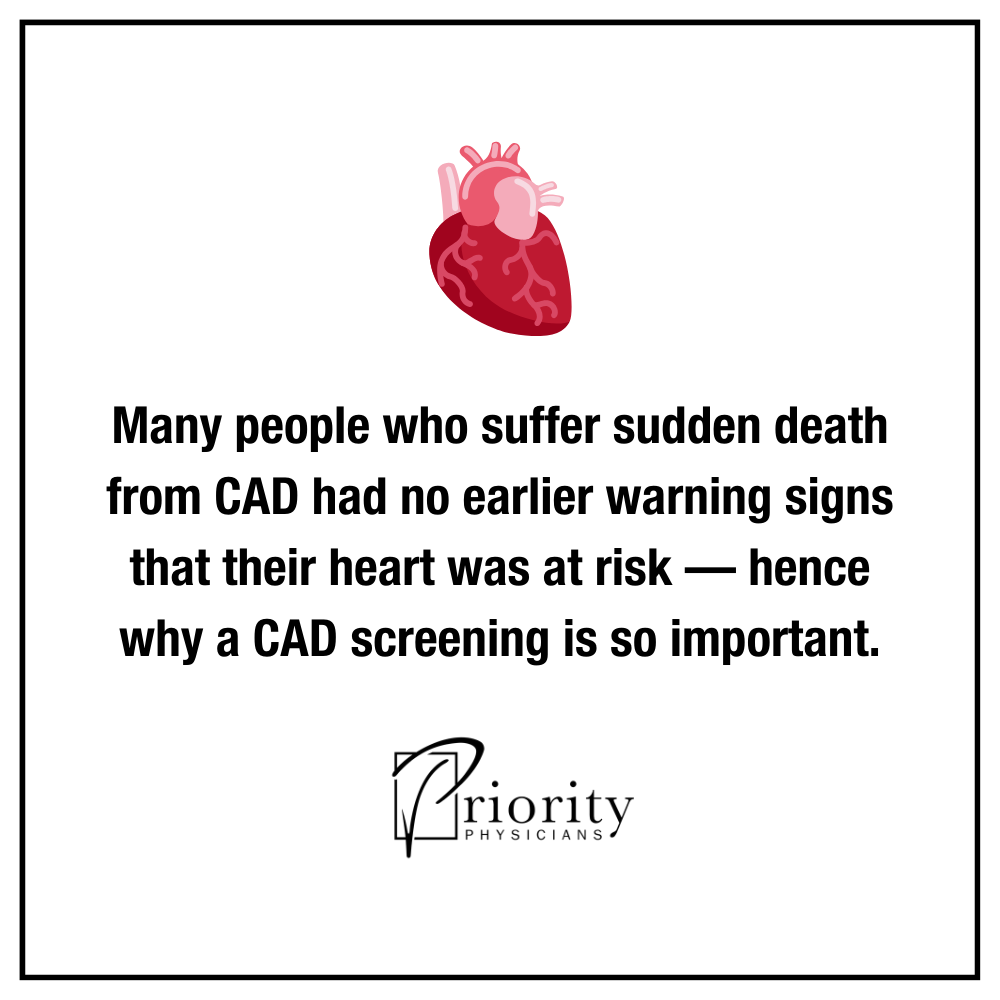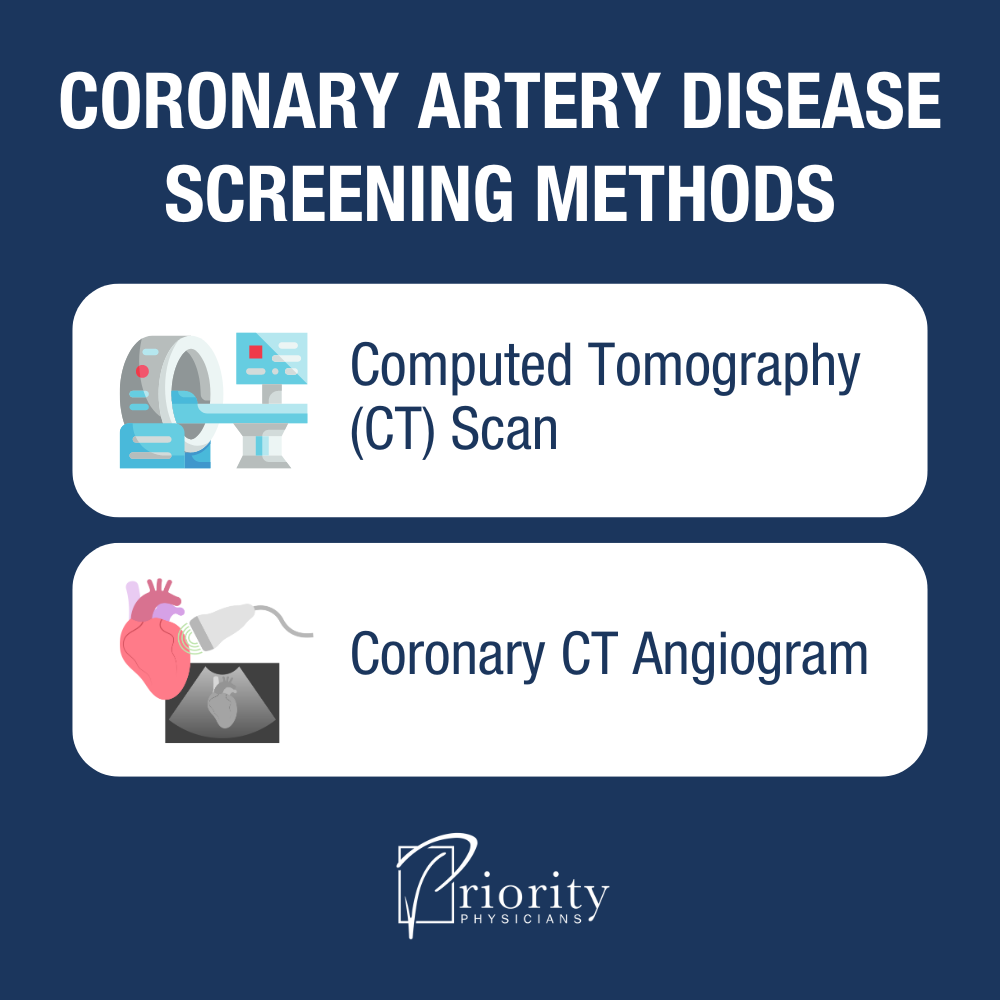If I asked you to name the most common disease among Americans, would you say coronary artery disease (CAD)?
That would be a winning guess.
Nearly 75% of all Americans experience some level of CAD in their lifetime. It’s brought on by high levels of plaque in the arteries that supply blood to the heart.
For half of those affected patients, plaque buildup will eventually fully impede blood flow. The heart falters and struggles to function, and the grim result is a fatal heart attack.
Coronary artery disease is, in fact, this country’s number one killer. And startlingly, many people who suffer sudden death from CAD had no earlier warning signs that their heart was at risk — hence why CAD screening is so important.

Why CAD Screening Is Important
Plaque on your blood vessel walls begins as a soft, buttery substance. Recognizing that this soft plaque doesn’t belong, your body adds calcium to it, eventually converting it to a hardened plaque that’s more stable (and hence easier to monitor).
But most “sudden deaths” are caused by blockage from soft plaque that hasn’t yet been calcified. And there’s another reason soft plaque is so lethal: The screening methods traditional primary care physicians use only detect hard plaque.
To illustrate, let’s compare two different patients to a couple of million-dollar houses.
Like the patients, the two homes may look identical on the outside. But take a peek inside: One may be a fully paid-off designer showcase, while the other has little furniture, a couple of mortgages, and an owner deep in debt.
The same can be true of patient health. If your cholesterol levels look great on the surface, a standard-practice physician may give you a clean bill of health without investigating further. Without a deeper peek, it’s hard to know what really lurks inside.
At Priority Physicians, we always take a deeper dive. CAD screening and preventative steps are essential measures to identify and resolve issues with harmful soft plaque in a timely way.

CAD Screening Methods
Computed Tomography (CT) Scan
A standard heart CT scan looks for plaque in your coronary arteries. The scan is generally available at local hospitals for a reasonable cost.
The downside is that CT scans only detect levels of hard, stable plaque, not the more dangerous soft plaque.
You receive a calcium score with your heart CT scan, indicating how much hard plaque was detected.
Coronary CT Angiogram
A coronary CT angiogram is an advanced CT scan of the heart with IV contrast. It’s the newest and most detailed screening method for arterial plaque.
The scan is almost like flying an airplane through your blood vessels for a close-up look. The coronary CT angiogram can:
- Detect both soft and hard plaque in your arteries
- Find narrow passages (stenosis)
- Detect how much blood flows through the stenosis
- Locate inflammation around blood vessel walls
Each of these results helps stratify your level of risk.
Not every traditional practice provides coronary CT angiograms. They’re expensive, and they require post-imaging processing and careful analysis of the results to determine the appropriate next steps for the patient.
At Priority Physicians, before recommending a patient for a coronary CT angiogram, we consider age, individual and family medical history, and other key factors.
During the scan, in addition to IV contrast, the patient is exposed to a small amount of radiation as well as medication to slow the heart. These elements are very carefully monitored for patient safety. If we recommend you for a coronary CT angiogram, it means we’re confident the benefits outweigh any minor risks.
How CAD Screening Prevents Coronary Artery Disease
When it comes to coronary artery disease, an ounce of prevention is worth a pound of cure. Everyone can work to prevent plaque buildup in the arteries. The best time to start is now.
Patients who’ve been screened and diagnosed with excess plaque must focus on prevention and CAD management, both to improve their current situation and avoid further issues. Preventive tactics include:
- Emphasis on healthy lifestyle choices, including regular cardiovascular and muscle-resistance exercise, as well as a heart-healthy diet low in salt and fats. When you realize the plaque in your coronary arteries could be life-threatening, you’ll likely think twice about eating that cheeseburger.
- Use of statins, as advised by your Priority Physicians. Although mostly recognized for lowering cholesterol, statins like Crestor, Lipitor, and Zocor are also useful in preventing CAD or improving conditions that lead to it.Occasionally, even for a patient with good cholesterol levels, I may prescribe a statin if other risk factors are present. The medication can decrease inflammation in blood vessel walls, stabilizing (or even reversing) plaque buildup over time.
Get Screened
At Priority Physicians, we believe in the value of CAD screening. Coronary artery disease can begin at a young age. As a team, you and your doctor determine when screening is appropriate.
We typically advise CAD screening for our patients aged 40 and above, even earlier for high-risk patients. If we find treatment is already needed, we help you address it immediately.
We welcome your questions about this important screening. Reach out or share this blog post with a friend or family member who may be at risk.

